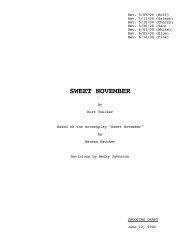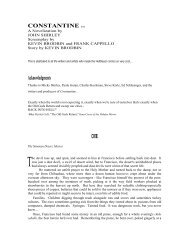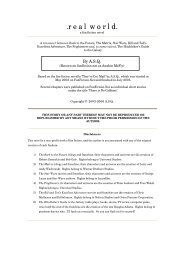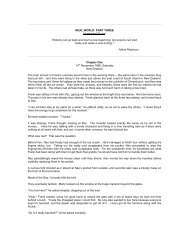Queer Keanu: Race, Sexuality and the Politics of - Whoa is (Not) Me
Queer Keanu: Race, Sexuality and the Politics of - Whoa is (Not) Me
Queer Keanu: Race, Sexuality and the Politics of - Whoa is (Not) Me
You also want an ePaper? Increase the reach of your titles
YUMPU automatically turns print PDFs into web optimized ePapers that Google loves.
to stop keeping a record <strong>of</strong> how many government contracts were given to racial<br />
minorities, he no longer recognized minority business owners as a group, “d<strong>is</strong>appearing”<br />
<strong>the</strong>m from <strong>the</strong> government record. As a result, affirmative action policies were rendered<br />
ineffective as <strong>the</strong>re were no recognizable inequalities to remedy. Yet, <strong>the</strong> act <strong>of</strong> coming<br />
out was not met with unqualified approval. It d<strong>is</strong>turbed antiessential<strong>is</strong>t factions <strong>of</strong> what<br />
might be termed a queer, as opposed to gay rights, movement. As Butler has argued, <strong>the</strong><br />
act <strong>of</strong> coming out <strong>of</strong> <strong>the</strong> closet creates <strong>the</strong> precondition <strong>of</strong> being in <strong>the</strong> closet. It produces<br />
a narrative that orders earlier activity as “closeted, “ in effect, reproducing <strong>and</strong> supporting<br />
<strong>the</strong> structure <strong>of</strong> <strong>the</strong> closet. For Reeves to claim or reject ei<strong>the</strong>r an exclusively queer or<br />
straight identity, <strong>the</strong>n, requires a capitulation to rigid <strong>and</strong> essential<strong>is</strong>t identity categories<br />
that fur<strong>the</strong>r divide <strong>and</strong> define sexual differences.<br />
Like <strong>the</strong> closet, passing also creates racial boundaries in <strong>the</strong> moment it crosses<br />
those boundaries. Elaine Ginsberg asserts that passing challenges problematic<br />
assumptions <strong>of</strong> identity saying, “… <strong>the</strong> first <strong>of</strong> which <strong>is</strong> that some identity categories are<br />
inherent <strong>and</strong> unalterable essences: presumably one cannot pass for something one <strong>is</strong> not<br />
unless <strong>the</strong>re <strong>is</strong> some o<strong>the</strong>r, prepassing, identity that one <strong>is</strong>” (4). In her analys<strong>is</strong> <strong>of</strong><br />
Imitation <strong>of</strong> Life (1959), Samira Kawash provides <strong>and</strong> extended reading <strong>of</strong> <strong>the</strong> moment<br />
<strong>the</strong> passing heroine, Sarah Jane, <strong>is</strong> confronted by her boyfriend. The scene culminates in<br />
h<strong>is</strong> slap in her face. Kawash argues, “It <strong>is</strong> at th<strong>is</strong> moment that <strong>the</strong> workings <strong>of</strong> h<strong>is</strong>tory are<br />
rendered effectively irrelevant in <strong>the</strong> violent restoration <strong>of</strong> <strong>the</strong> racial order that claims its













